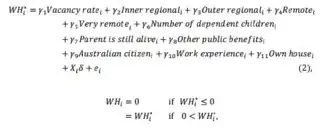The study seems unreliable to me but they do claim that.
For working hours up to around 25 hours a week, an increase in working hours has a positive impact on cognitive functioning. However, when working hours exceed 25 hours per week, an increase in working hours has a negative impact on cognition.
However, I question the study's reliability
The copy from the official site is a draft published in February 2016, but that does not include any actual data (UPDATE: the data is after the list of citation at the end of the PDF). It looks like a pre-print, and it is not published in a major journal or peer-reviewed, as far as I can tell.
Furthermore, it seems to me the model they are using to fit the data and deduct causation is obviously lacking. Here is what they use:

Which basically means they don't look if the correlation is different across some (IMO) absolutely significant factors such as mental health, job type and job satisfaction.
They say so explicitly
These variables are designed to capture the factors which impact on the labor
supply of the respondent, but not on their cognitive functioning.
and even add a disclaimer
The validity of the variables used to generate exclusion restrictions needs to be investigated in future research.
This is absurd given that they open their paper claiming that stress and fatigue are the cause of reduced cognitive ability
Work can be a double edged sword, in that it can stimulate brain activity, but at the same time, long working hours and certain types of tasks can cause fatigue and stress which potentially damage cognitive functions.
In other words, assuming this passes peer review, it would not show anything more that no matter the job, stress level and how much you hate it, working up to 30 hours is still better than not working in terms of cognitive fitness. I would not trust this paper to show that over that threshold things get worse, because of the lack of study on the confounding factors.
Finally, there seem to be very few studies like this, which might be a reason why they chose this bizarre (to me) methodology:
There are number of studies which examine the effects of the quality of work (job type and job task) on cognitive functioning (Schooler et al., 1999; Bosma et al., 2003; Potter et al., 2008; Finkel et al., 2009; Marquié et al., 2010; Smart et al., 2014).
However, there seem to be extremely few studies discussing the impact of the
quantity of work (working hours) on cognitive functioning
